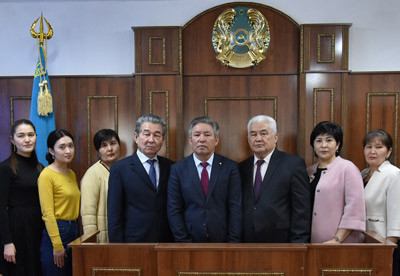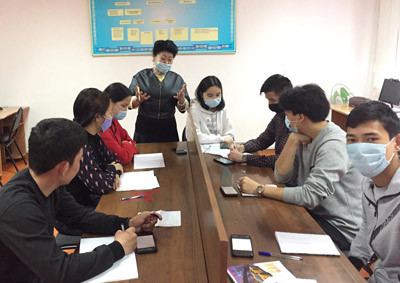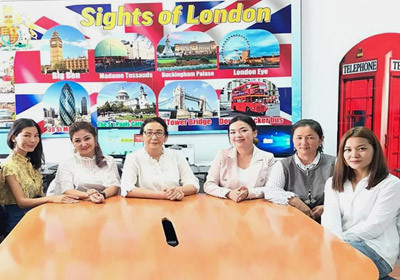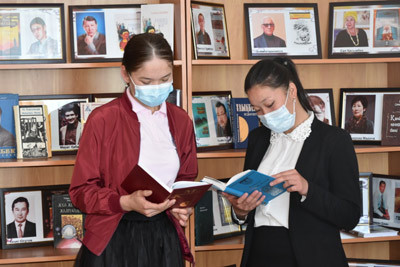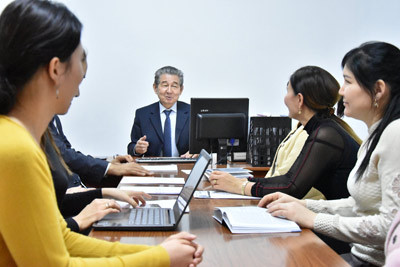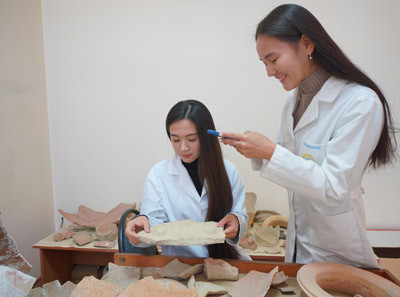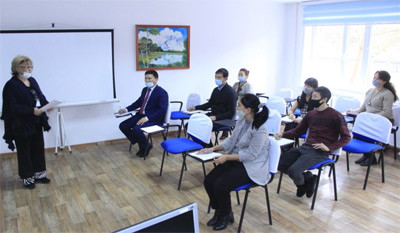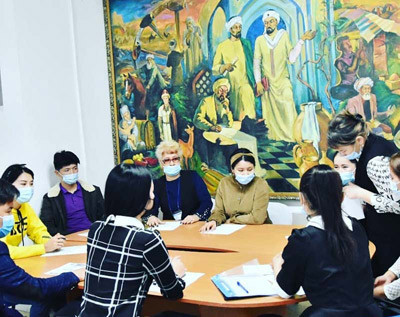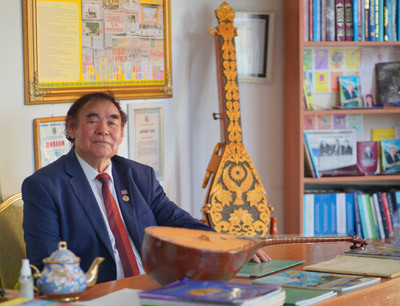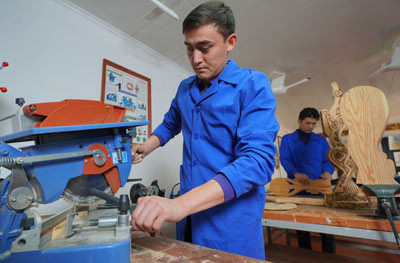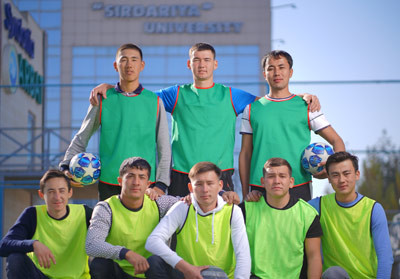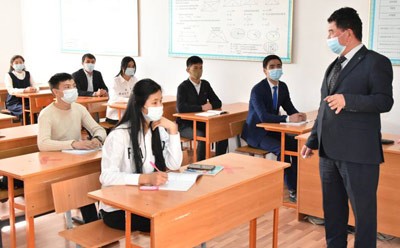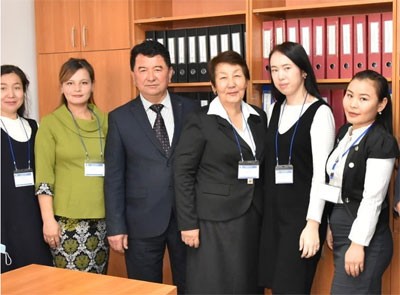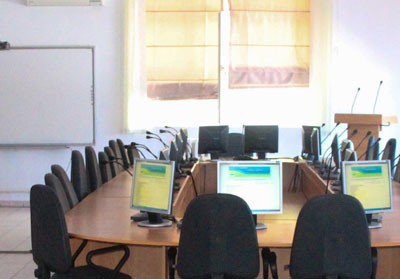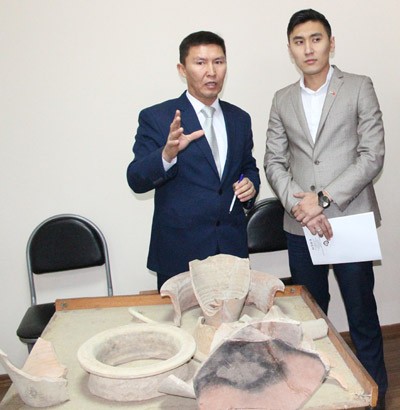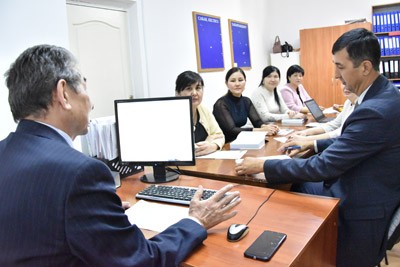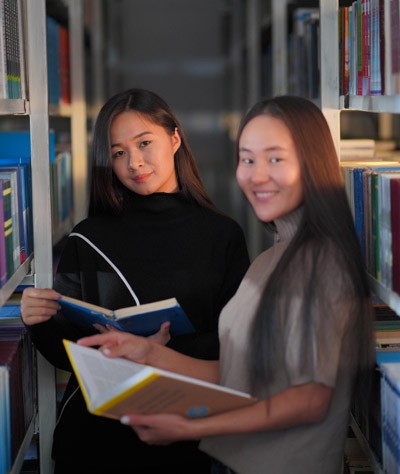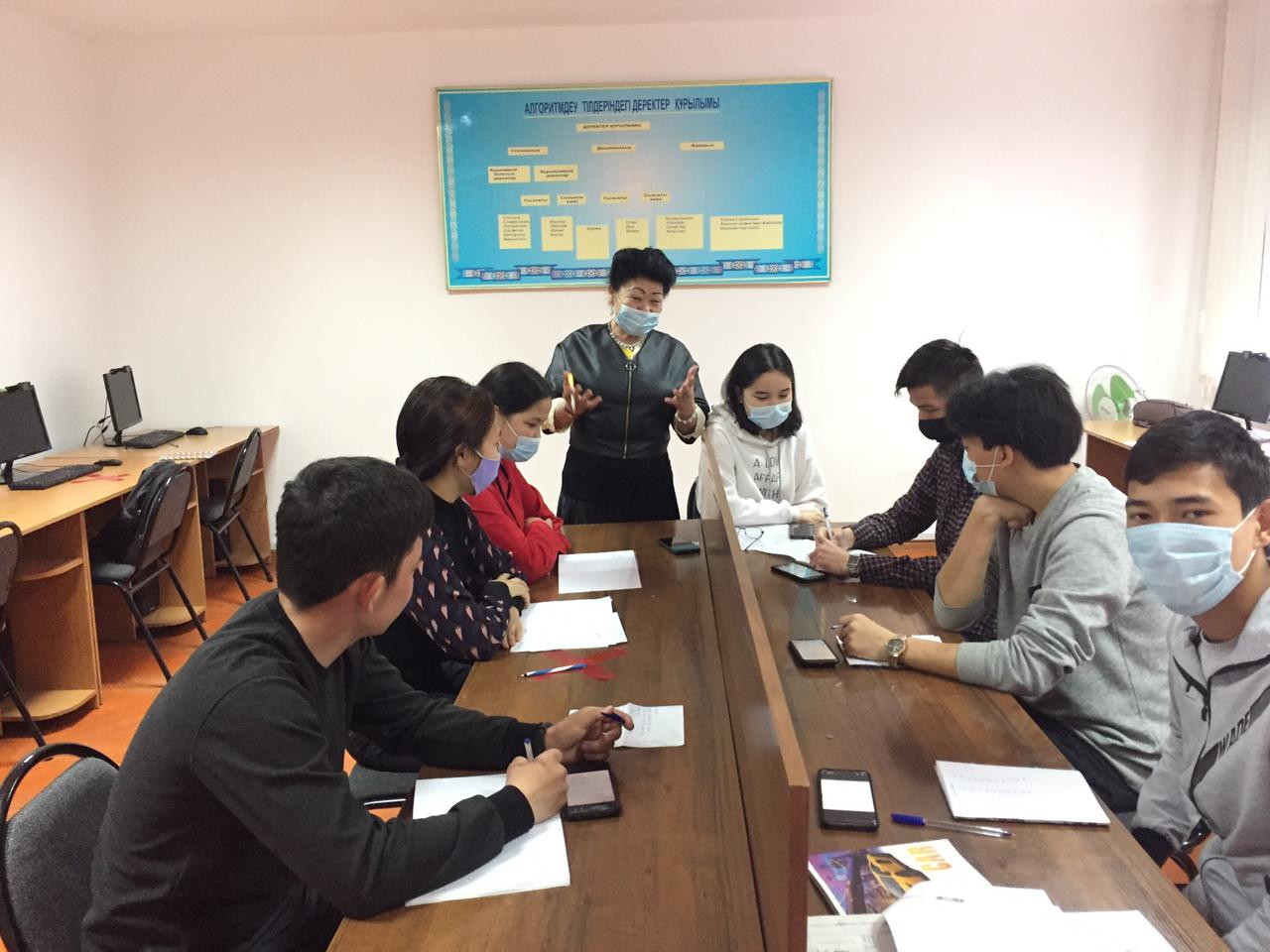
Undergraduate
6В01101- "PEDAGOGY AND PSYCHOLOGY"
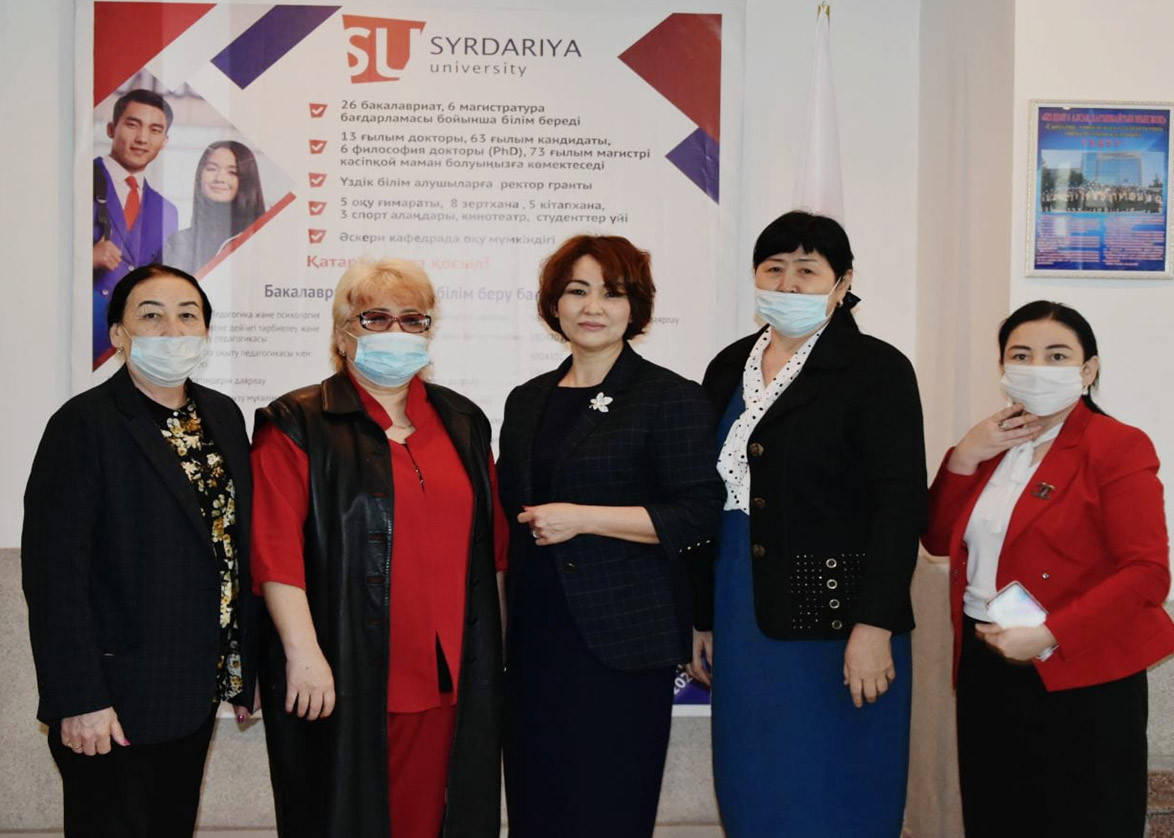
The program is aimed at obtaining basic knowledge and the formation of general requirements, professional skills as a result of their development in accordance with the characteristics of future professional activities. In addition, the program is developed according to the modular training principle and is coordinated with employers.
Protect the rights and personal interests of students, provide a safe environment for their learning and psychological and physical development, provide assistance and support in solving psychological, pedagogical and medico-social problems, prevent problems that may arise in the process of development and learning. student. comprehensive diagnostics of opportunities, assistance in strengthening mutual understanding and interaction between all participants in the educational process,
conducting Soviet educational work among students, teachers, parents, psychological support of educational programs.
The knowledge gained allows you to competently apply modern legislation.
training
application
training
After training in this specialty, you can work in the following organizations:
● school teacher-psychologist
● Psychological and consulting services as an educational psychologist and psychologist.
● Educator-psychologist of a preschool institution.
● Psychologists of state and non-state enterprises.
● Psychologists of banks, insurance and audit companies.
● Psychologists of educational organizations.
● pedagogical and psychological services in secondary and vocational schools.
● Psychologists of commercial organizations.
Persons who have mastered the educational programs of higher education are accepted to the master's program.
Persons entering the master's program must submit the following documents to universities or scientific organizations::
1) application addressed to the head of the organization (in any form);
2) a copy of the document on higher education;
3) a notarized copy of the document on higher education with the appendix;
4) a copy of the identity document;
5) a personal personnel record sheet and a document confirming employment (for persons with work experience);
6) six 3x4 cm photos;
7) medical certificate form 086-U;
8) certificate of completion of comprehensive testing;
Describe how to proceed and what documents are needed
1) application of the established sample;
2) two 3x4 photos;
3) certificate of education (original);
4) a copy of the identity card;
5) medical certificate type 086-U;
6) a receipt of the paid money for passing the test.
Tuition for this program is paid annually. The cost of training-399000 tenge.
The cost of training includes the cost of training, lectures, seminars, individual consultations, use of libraries, wi-fi
|
№ |
Name of the disciplines |
Brief description of the disciplines |
|
|
|
|
|
Cycle of general education disciplines University component and / or optional component |
|
|
|
1 |
Organization of business activities |
Theoretical and practical knowledge in the field of entrepreneurship. Priority areas of business activity in Kazakhstan. Successful business experience. Development of a Business plan. Economic policy of the state. |
5 |
|
|
|
|
Cycle of basic disciplines Higher education institution component |
|
|
|
2 |
Physiological and psychological development of students |
On the basis of the regularities of the physiological and psychological development of students, the issues related to the anatomical, physiological and psychological characteristics of children and adolescents, the formation of personality, the preservation and promotion of health are considered. |
5 |
|
|
3 |
Pedagogy and methods of educational work |
Its goals and objectives, categories, structure, methodological foundations determined on the basis of pedagogical science, the main stages of development, the concepts of the pedagogical process, forms, methods, and means of educational work are considered. |
5 |
|
|
4 |
Special pedagogical technologies in inclusive education |
The main concepts of the system of inclusive education, the features of inclusive education in educational activities, modern models of psychological and pedagogical support in the educational process in the context of inclusive education and the ways of its implementation are considered. |
3 |
|
|
5 |
Professional Kazakh (Russian) language. |
Kazakh (Russian) language in the communicative and discursive aspect, the basics of the profession and profession, the culture of business communication. Oral and written language in Kazakh/Russian for working with scientific texts and public speeches. Organization of professional activities in a diverse cultural environment. |
5 |
|
|
6 |
Professionally oriented foreign language |
Language proficiency level-B1-B2. Introduction to the subject area of the specialty in a professionally-oriented foreign language. Basic categorical conceptual apparatus and its variants in a foreign language. Professional and scientific terminology. Special professional-oriented material and its use in the specified professional conditions. Characteristics of the content of the subject area in the specialty in a foreign language. |
5 |
|
|
7 |
Fundamentals of defectology |
Defectology is a special field of pedagogy that studies the problems of teaching and raising children with natural disorders in visual, auditory, speech, and mental development. Defectology develops methods, means of teaching, education, and correction of children who require correction. |
4 |
|
|
8 |
Speech therapy. |
The discipline introduces the principles and methods of speech therapy, relations with other sciences, the anatomical and physiological mechanism of speech communication, the types of defects in the articulatory apparatus, the stages of speech development ,and the classification of speech defects. Detects speech disorders. |
4 |
|
|
9 |
Psychological and pedagogical diagnostics |
Identifies certain patterns of mental development in psychodiagnostics, finds the cause of a particular mental phenomenon, studies the level of giftedness, mindfulness, the properties of attention, cognitive processes. Performs psychological diagnostics of the individual, masters professional competencies and skills in the field of psychological counseling and develops skills for analyzing behavior. |
4 |
|
|
10 |
Psychological service at the school |
Teaches the documentation of the school psychologist, working with the levels of children of different ages, the main areas of psychological activity. Promoting the full-fledged mental development of schoolchildren, solving specific psychological problems that arise in the educational process, considering each student as a person, identifying the causes of difficulties in his development and ways to overcome them, aimed at developing his interests, capabilities, abilities. |
7 |
|
|
11 |
Correctional pedagogy |
This discipline introduces the basics of pedagogical correctional activity, the classification of developmental disabilities, the causes and mechanisms of the occurrence of developmental disabilities, and equips students with mental retardation, musculoskeletal system, and hearing impaired with correctional methods of teaching.recreational pedagogy |
6 |
|
|
|
|
Cycle of basic disciplines Selection Component |
|
|
|
12 |
Measurement evaluation technologies |
"Measurement technologies of assessment" teaches about the system, procedure, tools for assessing students ' achievements, about assessment and its types, the place and role of assessment in the educational process, the meaning and purpose of criteria-based assessment, methods of implementing summative and formative assessment, self-assessment and mutual assessment, and the compilation of quality criteria. |
4 |
|
|
13 |
Diagnostics of learning outcomes. |
The discipline "diagnostics of learning outcomes" teaches new methods of monitoring and evaluation, diagnostics of learning outcomes. |
|
|
|
14 |
History of pedagogy |
The History of Pedagogy studies the history of pedagogy around the world. The emergence and development of the practice of education, training and education, systematization and analysis of teachers ' reasoning and theories of each historical epoch. It forms socio-economic conditions, pedagogical ideas and thinking in different historical epochs. |
6 |
|
|
15 |
History of the development of pedagogical thought in Kazakhstan |
This course examines and analyzes the development of school history in Kazakhstan, pedagogical ideas and thoughts. |
|
|
|
16
|
Psychology of business communication |
Development and formation of business communication culture, types and ethics, rules and norms, requirements and principles, methods and forms.Defines the psychological features of technical business communication, mental business communication, ethics of business communication, service ethics in business communication. |
5 |
|
|
17 |
Psychology of constructive communication |
Describes the features of constructive communication, types of communication and interpersonal communication, functional responsibilities. Teaches the theoretical rules of effective communication in psychology, the specifics of interaction in the process of communication; ways of conflict resolution, activities and behavior of cultural activities and communication, discussion, self-assessment and introspection, the use of scientifically based methods and technologies in psychological activities. |
|
|
|
18 |
Psychological management |
The functional structure of managerial activity, psychological methods, psychological aspects of managerial decision-making and issues of managerial communication, styles, ways of leadership and success, selection of specialists are considered.Describes the features and principles of the psychology of teaching, education and the teacher, the rules and technology of psychological communication. |
4
|
|
|
19 |
Formation of professional orientation |
The discipline "formation of professional orientation" contributes to a deeper assimilation of the subtleties of teaching in educational institutions, professionally orients students. |
|
|
|
20 |
Educational management |
The article deals with pedagogical regularities of managing the system of relations in the educational system and the business world, areas of development, functional structure, methods of managerial activity, psychological aspects of managerial decision-making and problems of managerial communication, styles, ways of leadership and success, selection of specialists. |
5 |
|
|
21 |
School Studies |
The discipline "School science" teaches innovation management in school, pedagogical communication and management ethics |
|
|
|
22 |
Этнопсихология и национальное сознание Ethnopsychology and national consciousness |
It examines the characteristic national character of various ethnic groups, the characteristic psychological features of ethnic groups. The spiritual activity of each nation is characterized by the main criteria that reflect the psychology and consciousness of this nation. Mastering the mental characteristics of representatives of different peoples and cultures, national worldview, tasks of self-consciousness and ethnic stereotypes, patterns of formation, formation of national communities and society. |
6 |
|
|
23 |
Ethnopedagogy |
Ethnopedagogy is a new field of pedagogical knowledge that studies the development of pedagogy of ethnic communities, the ideological, educational cultural heritage of a certain people, tribe with its inherent specifics. It explores the content and methods of the best practices of the people in the education of generations. |
|
|
|
24
25 |
Methods of teaching psychologyopedagogy |
"Methods of teaching psychology" introduces students to the laws, principles, methods, means of teaching psychology in college, masters the methods of conducting lectures, seminars, and practical classes. |
5 |
|
|
Psychological trainings |
The discipline "psychological training" describes the theoretical and methodological foundations of psychological training, general theoretical foundations of group psychological work, types of training groups. Teaches the general basics of conducting psychological training, the basic theories and techniques of a social psychologist used in practice, the basic training exercises |
5 |
||
|
26 |
Methods of teaching pedagogy |
This discipline introduces students to the laws, principles,methods, and means of teaching pedagogy in college. He knows the methods of conducting lectures,seminars, and practical classes |
6 |
|
|
27 |
Teacher training courses |
Pedagogical trainings-a system of various exercises conducted according to a planned program, providing for the formation and improvement of students ' skills in improving the quality of education. Types of training: training, active training, professional and pedagogical training. |
|
|
|
28 |
Methodology of scientific and pedagogical research training. |
The discipline "methodology of scientific and pedagogical research" introduces the essence of scientific and pedagogical activity, scientific and pedagogical research and its methodological principles. It examines the problems of modern pedagogical research, methods of theoretical and empirical research, types of pedagogical experiment, their activities in scientific research. |
4 |
|
|
29 |
Methodology of scientific and psychological research |
The discipline "methodology of scientific and psychological research" is aimed at studying the achievements of world and domestic psychological sciences, studying the main directions and principles of modern psychological science, the current state of psychological theory and practice. |
|
|
|
30 |
Innovative technologies in education |
The discipline "innovative technologies in education" introduces the concept of pedagogical technology,with the definitions given by teachers to the concept of "pedagogical technology", gives a description of teaching technologies based on primary school subjects. |
5 |
|
|
31 |
New methods and techniques of teaching at school |
The subject "new methods and techniques of teaching in school" shows how to use new methods and techniques that exist in school. |
|
|
|
32 |
Professional pedagogy |
Professional pedagogy is a part and academic discipline of pedagogical science.The discipline introduces the main categories of professional pedagogy, the pedagogical system and its structural components, and the theory of professional education management. |
5 |
|
|
33 |
Social Psychology |
Patterns of activity and discipline of people in social groups, which consider the spiritual characteristics of groups. It characterizes the psychology of groups of family, collective, class, nation, and other people, classified according to their location, profession, and place in society. |
5 |
|
|
34 |
Social pedagogy |
Social pedagogy is a branch of pedagogy that studies the influence of the social environment on the upbringing and formation of the individual, developing a system of measures to optimize the upbringing of the individual, taking into account the specific conditions of the social environment. |
5 |
|
|
35 |
History of modern psychology |
It examines milestones in the history of the development of psychological science: the science of the soul, the science of consciousness, the science of behavior, and the psyche. Psychological trends (schools) abroad: behaviorism, Gestalt psychology, Freudianism or psychoanalysis, genetic psychology, features, theories, directions of development of humanistic psychology. |
5 |
|
|
36 |
Art therapy |
Art therapy as a special type of professional activity is closely related to psychotherapy. Process In Art therapy, unconscious conflicts and anxiety disorders are more easily manifested through visual images than in verbal psychotherapy. Promotes the strengthening of art-therapeutic relationships in psychology |
5 |
|
|
37 |
Logotherapy |
Logotherapy-theory and practice of psychotherapy, analyzed by V. Frankl. Logotherapy proceeds from the fact that the main driving force in the behavior of the individual and its development is the desire of a person to seek and realize the meaning of his life. Offers ways to treat neogenic neuroses in humans. |
|
|
|
38 |
Family pedagogy |
"Family pedagogy" introduces the development of family and marriage in the history of society, the peculiarities of creating a family and marriage in the Kazakh people, the structure and development of the modern family, functions, features of the functioning of the family at different stages, teaches the ways of raising a child in the family. |
6 |
|
|
39 |
Creative education |
The subject "creative education" studies the methods of teaching a child versatile, creative work, considers the possibilities of forming a creative personality. |
6 |
|
|
40 |
Psychology of the family. |
Family psychology is an interdisciplinary field in psychology that studies the problems of marriage and family. The family is a small group consisting of marriage, family ties, the most important form of organization of personal life, and a type of social community |
|
|
|
41 |
Child psychology |
Child psychology considers the following issues: methods of research of child psychology, the role of biological and social factors, mental development and training, periodization of mental development, features of mental development of children. |
|
|
|
42 |
Educational psychology |
Systematizes, expounds and explores the psychological features and patterns of intellectual and personal development of a person in various conditions of educational activity, the educational process. It examines the content composition of three areas: the psychology of learning, the psychology of education, and the psychology of the teacher. |
4 |
|
|
43 |
Sign language teaching, typhlopedagogics |
Sign language teaching is the science of education and training of children with hearing disorders, a section of defectology. The normal functioning of the auditory analyzer is of particular importance for the overall development of the child. The state of hearing affects the child's speech and psyche. In case of violation of the auditory analyzer, primary speech deviations, secondary-a decrease in cognitive activity. |
|
|
|
44 |
Psychology of professional counseling |
Explains maladaptive behaviors, psychological difficulties, so that a person can solve psychological problems that they have encountered in their personal life, professional activities, studies, and other situations. It helps to study the personal life values of a person, to understand conflicts, to find new ways to master the situation. The consultation is conducted when the Psychologist can not directly control the process of changing the situation, but tries to change the situation. |
5 |
|
|
45 |
Practical psychology |
Practical psychology is a branch of psychological sciences that studies the manifestation of mental properties, quantitative and qualitative indicators of developmental features, and determines the ways of processing properties with developmental deviations. The features of the activity of a practicing psychologist, its difference from the activities of a psychiatrist and a psychotherapist are considered. |
3 |
|
|
46 |
Psychotherapy |
It examines the psychological approaches that suggest the cause of a person's illness, and methods of its treatment, the study of the type of therapeutic experience between psychology and medicine. When a person is subject to various mental illnesses, nervous disorders, etc., a state of emotional instability, he describes his treatment system, affecting his fuzzy system of thinking and consciousness with verbal and impressive actions. |
5 |
|
|
47 |
Correctional psychology |
Correctional psychology introduces the main tasks of psychocorrection, types of correction, stages, directions of psychocorrection work, requirements for conducting psychocorrection, teaches how to work with children with disabilities. |
5 |
|
|
48 |
Психология конфликта The psychology of conflict |
"Psychology of conflict" examines the levels, types of relations, conflict (conflict) - conflict contradictions of the parties aimed at different interests, types of conflicts, causes of conflict (conflict), psychological, physiological, material, social aspects, indicates ways out of the conflict, gives recommendations for conflict avoidance. |
3 |
|
|
49 |
Conflictology |
The problem of conflict is a socio-psychological problem. The connection between the conflict of man and society goes back to the ancient social philosophy. Types of conflict: open and closed conflict, motivational conflict, communication conflict, conflict on the way to the goal, status conflict. This course teaches ways to resolve a conflict. |
5 |
|
Based on the results of an audit by theIndependent Agency for quality assurance in education (IQAA)conducted in April 201-11, the program received international accreditation for 5 years.

